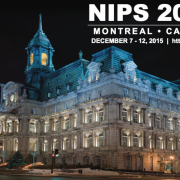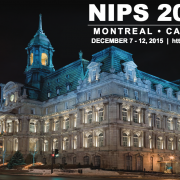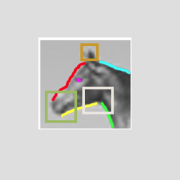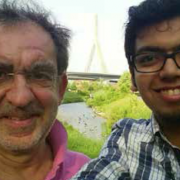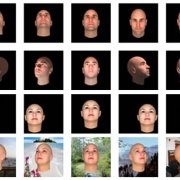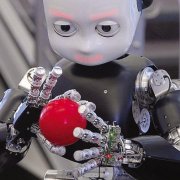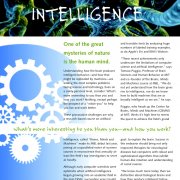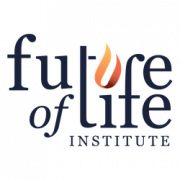October 7, 2015 - 3:15 pm
Wiktor Mlynarski (McDermott lab, MIT and CBMM).
October 5, 2015 - 4:30 pm
Prof. Sam Gershman (CBMM, Harvard) and Prof Noah Goodman (CBMM, Stanford) are helping organize the Bounded Optimality and Rational Metareasoning NIPS 2015 workshop:
We are pleased to announce a NIPS workshop on Bounded Optimality and Rational Metareasoning, which will take place on December 11, 2015, in Montreal, Canada.
This workshop brings together computer scientists working on bounded optimality and metareasoning with psychologists and...
October 5, 2015 - 2:15 pm
Prof. Joshua Tenenbaum (CBMM Research Thrust Leader) and Tejas Kulkarni (CBMM Siemens Graduate Fellow) are helping to organize a workshop for NIPS 2015 Workshop on Black Box Learning and Inference, on December 12, 2015. Papers are being accepted now through October 2, 2015.
NIPS 2015 Workshop on Black Box Learning and Inference
December 12, 2015, Montreal, Canada
Submission deadline: October 2, 2015
1. Workshop Overview
Probabilistic models...
October 1, 2015 - 3:00 pm
MIT News has published an article featuring the most recent conference paper by graduate students Charli Fogner and Chiyuan Zhang in the Centor of Brains, Minds and Machines, Hossein Mabahi of the Computer Science & Artificial Intelligence Lab at MIT, Mauricio Araya-Polo of Shell Int'l Exploration & Production, and Tomaso Poggio, the Eugene McDermott Professor in the Brain Sciences and Human Behavior and Director of CBMM.
Project...
September 30, 2015 - 4:15 pm
MIT MIBR 46-3189
Guy Ben-Yosef: Full interpretation of minimal images
Abstract:
We aim to model the process of ‘full interpretation’ of object images, which is the ability to identify and localize all semantic features and parts that are recognized by human observers. We model the interpretation process by identifying primitive components and relations that play a...
We aim to model the process of ‘full interpretation’ of object images, which is the ability to identify and localize all semantic features and parts that are recognized by human observers. We model the interpretation process by identifying primitive components and relations that play a...
September 30, 2015 - 3:00 pm
MIT Bldg 46, Room 46-3015
Bob Desimone
Doris and Don Berkey Professor, BCS, MIT
Director, MIBR, MIT
Rebecca Saxe
Professor, BCS, MIT...
MIT Campus, Bldg 46, Room 46-3015 (next to the Bldg 46 postdoc lounge)
September 10, 2015 - 2:45 pm
The May issue of Connect - Newsletter of IUSSTF, contained a interview with Hitesh Arora, a 2015 SN Bose Fellow, who visited Prof. Tomaso Poggio's lab during Spring 2014 and Summer 2014.
"Getting selected in the SN Bose Scholars Program to pursue research internship at Massachusetts Institute of Technology (MIT) opened a door to an incredibly enriching experience for me. I worked at the Center for Biological and Computational Learning (CBCL)...
September 9, 2015 - 4:00 pm
Jaan Tallinn
CBMM will host a brief talk by Jann Tallinn (followed by extensive QAs): Solving Global Coordination
Jaan Tallinn is an Estonian computer scientist who participated in the development of Skype in 2002 and FastTrack/Kazaa, a file-sharing application, in 2000.
He graduated from the University of...
Jaan Tallinn is an Estonian computer scientist who participated in the development of Skype in 2002 and FastTrack/Kazaa, a file-sharing application, in 2000.
He graduated from the University of...
September 3, 2015 - 3:30 pm
MIT McGovern Institute for Brain Research (MIT Bldg 46)
Tomaso Poggio
The Center for Brains Minds and Machines (CBMM) is organizing a workshop on "Understanding Face Recognition: neuroscience, psychophysics and computation" from 3:30pm on September 3rd to 1pm on September 5th, 2015, at MIT in Cambridge. Attendance to workshop is by invitation only.
At the workshop we...
At the workshop we...
August 22, 2015 - 9:00 am
McGovern Institute for Brain Research at MIT
This event is invitation only.
Retreat Agenda
Flash Presentation List
Retreat Agenda
Flash Presentation List
August 13, 2015 - 9:00 am
Excerpt:
"Il robot bambino iCub, insieme al gruppo di ricercatori dell’Istituto Italiano di Tecnologia (Iit) guidato da Giorgio Metta, è da oggi negli Usa, in occasione della Summer Course del Center for Brains, Mind and Machines (Cbmm) del Mit (Massachusetts Institute of Technology), per dimostrare fino al 3 settembre a studenti e ricercatori di tutto il mondo le applicazioni pratiche delle capacità di apprendimento legate al Deep learning...
August 13, 2015 - 9:00 am
The Marine Biological Laboratory
Brains, Minds and Machines
The Marine Biological Laboratory, Woods Hole, MA
Course Date: August 13 – September 3, 2015
Deadline: March 16, 2015* .
*Please note that registration is now closed.
Directors: Gabriel Kreiman, Harvard University; and Tomaso Poggio, Massachusetts Institute of Technology (...
The Marine Biological Laboratory, Woods Hole, MA
Course Date: August 13 – September 3, 2015
Deadline: March 16, 2015* .
*Please note that registration is now closed.
Directors: Gabriel Kreiman, Harvard University; and Tomaso Poggio, Massachusetts Institute of Technology (...
August 1, 2015 - 12:00 pm
Excerpt:
"Understanding how the brain produces intelligent behavior- and how that might be replicated by machines - are among the most complex problems facing science and technology."
July 10, 2015 - 8:45 am
Device can help them check if they're taking the right medicine, recognise familiar faces
The Straits Times, July 10, 2015
Institute for Infocomm Research - A*Star, a CBMM International Partner, has developed an application which utilized the GoogleGlass platform to help users recognize people and discreetly send medical reminders.
Excerpt:
"Scientists in Singapore are developing intelligent glasses that can recognise different people, for...
July 6, 2015 - 3:15 pm
New International Grants Program Jump-Starts Research to Ensure AI Remains Beneficial
Elon-Musk-backed program signals growing interest in new branch of artificial intelligence research
Amid rapid industry investment in developing smarter artificial intelligence, a new branch of research has begun to take off aimed at ensuring that society can reap the benefits of AI while avoiding potential pitfalls.
The Boston-based Future of Life Institute (...


